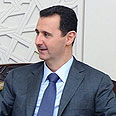
Report: Syria dispersed chemical weapons across 20 sites
Western anxieties heightened over reports that Syria has scattered its chemical weapons throughout the war torn country. Growing fears that not all locations have been identified
Western spy agencies suspect Syria’s government has several hundred tons of chemical weapons and precursor components scattered among as many as 20 sites throughout the country, the Washington Post reported on Thursday.
This, the paper reported, heightens anxieties about the ability to secure the arsenals in the event of a complete breakdown of authority in the war-torn nation, US and Middle Eastern officials say.
Related stories:
- Israel closely monitoring Syria's chemical weapons
- Obama: Chemical weapon would alter Syrian equation
- US fears Assad relocating chemical stockpiles
Officials are monitoring the storage sites, but they expressed growing fear that they have not identified every location and that some of the deadly weapons could be stolen or used by Syrian troops against civilians.
"We think we know everything, but we felt the same way about Libya,” a former American intelligence official who was briefed on US preparations for both conflicts told the newspaper.
“We had been on the ground in Libya, yet there were big surprises, both in terms of quantities and locations.”
The stockpile appears to be larger and more widely distributed than originally suspected, according to two officials who have seen the intelligence reports. They said the most dangerous chemical stocks are kept in bunkers in about a half-dozen locations, while as many as 14 other facilities are used to store or manufacture components.
Because of the risks posed by the stockpile, US spy agencies have devoted enormous resources to monitoring the facilities through satellite imagery and to developing plans to safeguard the weapons if the crisis worsens, current and former US officials said.
“It’s obvious that ensuring their security is paramount,” a US official said. “Planning for different scenarios, consulting appropriately with allies and preparing to manage any new challenges is simply being responsible.”
Several current and former officials acknowledged the difficulty of securing chemical depots inside Syria, given the fighting underway and the likelihood of fierce resistance from Syrian forces to any incursions by outsiders. Some of the officials also conceded that there may be yet-undetected facilities within the country, roughly the size of Washington state.
The former US intelligence official said North Korea and Russia have assisted Syria over the decades in constructing weapons facilities that are well-fortified and shielded from spy satellites. “They are masters at concealment,” the former official said.
'Unstable reality'
In August, a Syrian Foreign Ministry spokesman, Jihad Makdissi, said the Damascus government would never use chemical arms against its people, but he warned that it would unleash the weapons against what he called foreign invaders. He said the military was guarding the stockpile.
President Obama cautioned the Syrian government that any deployment of its chemical weapons would cross a “red line” and invite an immediate response by the West.
The Security Cabinet focused on the issue of Syria's chemical weapons at their meeting earlier this week.
Defense establishment officials claim President Bashar Assad's regime in Damascus is on the verge of collapse, while intelligence officials are concerned that Syria's chemical weapons will fall into the hands of the rebels or Hezbollah terrorists in Lebanon.
The intelligence officials told the ministers Israel is constantly monitoring chemical weapons caches in Syria, adding that any attempt to smuggle chemical weapons to Hezbollah or any other element may lead to an Israeli operation, which may result in an outbreak of violence along the northern border.
The Syrian threat was also addressed by GOC Northern Command Yair Golan who expressed his concerns over the uncertainties in neighboring Syria.
"Syria is a massive armaments warehouse; some (of the weapons) are of the most advanced available, what will be the fate of the weapons with the expected collapse of the regime – no one knows."
According to Golan, "We are in an unstable reality, on the Lebanese border the Hezbollah is …preparing missiles and rockets and threatening to harm Israel's home front. In Syria the Baath regime is falling apart. Some 30,000 dead and 200,000 more refugees – those are the 'achievements' of the Arab Spring for Syria."
The senior officer also warned that "Global Jihad is streaming to this country in conflict (Syria), and their presence on our border does not bode well either." According to Golan "The challenges we are facing are very significant. We are a peace seeking nation, but if war is forced upon us, then those who seek to kill us will feel the strong arm of the IDF."
Yoav Zitun contributed to the report
- Receive Ynetnews updates directly to your desktop










